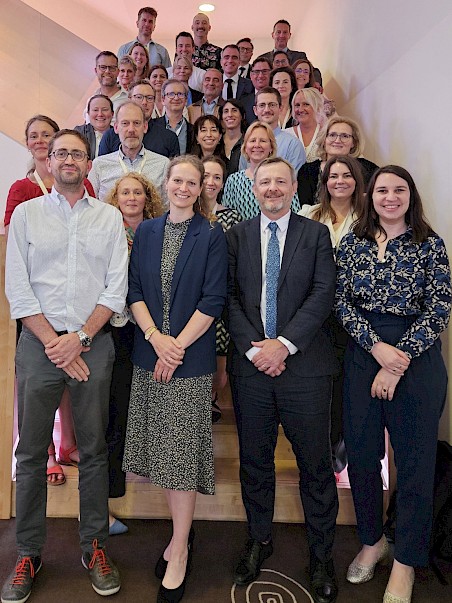Actions agreed to further protect and conserve the North-East Atlantic
Countries from around the North-East Atlantic met this week in Berlin, Germany for the 2024 meeting of the OSPAR Commission for the Protection of the Marine Environment of the North-East Atlantic, to discuss collective actions to help protect the marine environment. The meeting was opened by Stefan Tidow, State Secretary of the Federal Ministry for the Environment, Nature Conservation, Nuclear Safety and Consumer Protection (BMUV). In his opening address, Mr Tidow praised OSPAR for its distinguished history stating that “It is our firm belief that functioning regional sea cooperation is a good baseline for functioning global marine governance”.
In direct response to findings of OSPAR’s 2023 Quality Status Report (QSR), Contracting Parties to the OSPAR Convention adopted further measures to protect and conserve the North-East Atlantic including:
- BEACH LITTER REDUCTION TARGET: An ambitious beach litter target which commits OSPAR countries to a 70% reduction in the prevalence of all marine litter on beaches by 2030. This complements the existing OSPAR target on single-use plastics (SUP) and maritime-related plastic items of a 50% reduction by 2025 and 75% by 2030.
- ACTION ON LITTER FROM THE FISHING INDUSTRY: Measures on the management of expanded polystyrene (EPS) and extruded polystyrene (XPS) fish boxes in ports. These measures encourage all ports that handle these types of boxes to take action to guarantee appropriate disposal to prevent release of EPS/XPS into the marine environment.
- A REGIONAL ACTION PLAN FOR MARINE BIRDS: OSPAR’s QSR 2023 noted that marine birds continue to be in trouble in the North-East Atlantic due to the effects of climate change and habitat loss and degradation. To address this, a Regional Action Plan (RAP) for Marine Birds was adopted. The RAP identifies a series of important protection and conservation actions that support the achievement of the North-East Atlantic Environment Strategy 2030 to achieve biologically diverse and healthy seas, and which will help to halt the decline of marine birds.
- ACTION TO REDUCE THE IMPACTS OF FISHING ON MARINE BIRDS: Contracting Parties adopted measures to reduce incidental bycatch of marine birds from all fishing gears along with commitments to collate data and assess interactions between fishing effort and marine bird bycatch.
- GUIDANCE ON DECOMMISSIONING: to ensure that OSPAR’s policy to remove disused offshore installations from the marine environment is delivered, a new Harmonised Comparative Assessment Methodology was agreed.
- BEST PRACTICE GUIDELINES: a key role of OSPAR is to develop best practice guidelines so that activities that take place in the marine environment are sustainable and that any effects are minimised. This year OSPAR adopted guidelines for: the management of dredged materials, Zostera (seagrass) beds habitat restoration, the life cycle management of EPS and XPS, the reduction of marine litter through sustainability training programmes for fishers, monitoring of microlitter (including microplastics) in seafloor sediments, and data collection on discharges, spills and emissions from offshore oil and gas installations.
OSPAR Contracting Parties announced that its next meeting of Ministers from around the North-East Atlantic would be in Spain on Thursday 26 June 2025. At this meeting Ministers will review progress against OSPAR’s North-East Atlantic Environment Strategy 2030 – our shared Roadmap to achieving our vision of a clean, healthy and biologically diverse North-East Atlantic Ocean, which is productive, used sustainably and resilient to climate change and ocean acidification.
ENDS

Note for editors
- The OSPAR Commission was set up by the 1992 OSPAR Convention for the Protection of the Marine Environment of the North-East Atlantic, which unified and updated the 1972 Oslo and 1974 Paris Conventions. It brings together the governments of Belgium, Denmark, Finland, France, Germany, Iceland, Ireland, Luxembourg, the Netherlands, Norway, Portugal, Spain, Sweden, Switzerland and the United Kingdom, together with the European Community.
- OSPAR adopted its North-East Atlantic Environment Strategy 2030 at a Ministerial meeting in Cascais (Portugal). Full text https://www.ospar.org/convention/strategy
- Article 2 of the OSPAR Convention https://www.ospar.org/site/assets/files/1169/ospar_convention.pdf states that “The Contracting Parties shall, in accordance with the provisions of the Convention, take all possible steps to prevent and eliminate pollution and shall take the necessary measures to protect the maritime area against the adverse effects of human activities so as to safeguard human health and to conserve marine ecosystems and, when practicable, restore marine areas which have been adversely affected. To this end Contracting Parties shall, individually and jointly, adopt programmes and measures and shall harmonise their policies and strategies. OSPAR measures can be found on the OSPAR website https://www.ospar.org/convention/agreements Measures adopted at the meeting will be prepared for publication on the OSPAR website over the summer. Further communications will be provided when these are available.
- OSPAR’s Quality Status Report (QSR) was published in 2023 and can be read here https://oap.ospar.org/en/ospar-assessments/quality-status-reports/qsr-2023/ The QSR comprises a synthesis report and 15 thematic assessments that are underpinned by 120 assessments and their underlying datasets. The key findings of the QSR 2023 show that: Climate change and ocean acidification are drivers of major change; Despite improvements in some fish populations, many are not in good status; Marine birds are still in trouble; Many marine mammals remain at risk, even while some species are recovering; Negative impacts from oil and gas activities continue to decrease; Marine litter levels remain high despite signs of improvement; Pollution by radioactive substances has been prevented; Hazardous substances are cause for concern; Noise pollution remains a threat; Introductions of new non-indigenous species (NIS) appear to have decreased; Benthic habitats continue to be damaged; Plankton, the base of the marine food web, are impacted in pelagic habitats; We know relatively little about the status of marine turtles; The state of marine food webs is of great concern; Eutrophication persists https://oap.ospar.org/en/ospar-assessments/quality-status-reports/qsr-2023/synthesis-report/key-messages/
